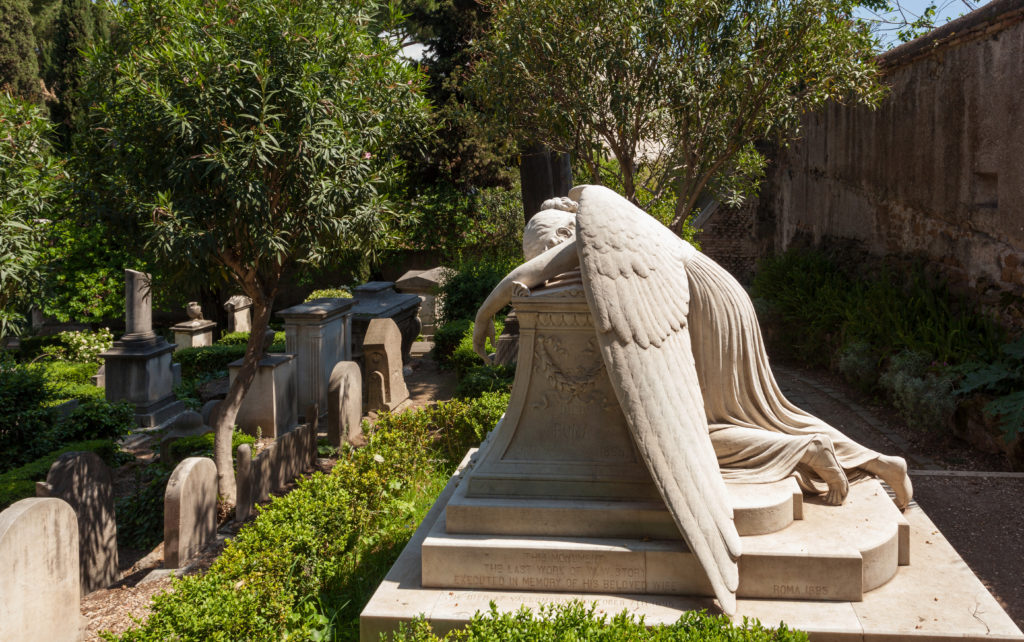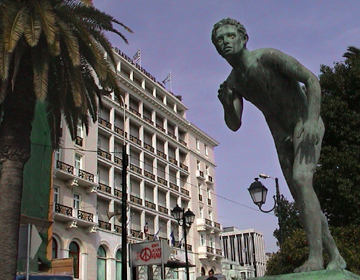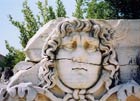A Marriage Unravels in Athens
By Amanda Castleman
Published in Greece, A Love Story, a 2007 Seal Press anthology
 The cockroach skittered across my throat. I sprang awake cursing and crying. Then I slapped my bare neck until bruises began to shadow the pale skin.
The cockroach skittered across my throat. I sprang awake cursing and crying. Then I slapped my bare neck until bruises began to shadow the pale skin.
I knew this would happen if I ate Doritos in bed. In August. In Athens.
But I didn’t stop. Pandora’s box was empty, devoid even of hope.
My husband had left abruptly a week ago. “I don’t want to live together next year,” he announced, after waking me with kisses, tiropita – cheese pastry, my favorite breakfast – and ellinikos kafes sketos. The sugarless Greek coffee was sludgy with grounds: thick like my thoughts, my heart, the very blood in my veins.
“I just have to go,” he said.
I stood, drawing on every ounce of haughty grace gleaned in seven European years-the whole arc of our marriage, in fact. “Then go. I’m taking a shower now. I expect to be alone when I’m done.”
***
Silent, I crouched over the fetid drain. All the pipes reek in Athens, even in Kolonaki, the capital’s toniest district. This stinking city, built on olives and seawater and the tears of slaves. I trembled with hate, confusing, as always, place and the emotion encountered there.
He slunk out. Paused. Called through the diminishing crack in the doorway, “I’m sorry. I’ll love you always. But I have to go.”
***
Sucker punched, dripping, I curled onto the daybed. No one even knew where I was. Last night, we’d returned to a slapdash sublet after months in Turkey, the Aegean, Hungary, and Romania. Every acquaintance had already fled the meltemi, the hot winds that scour the Saronic Gulf in summer. Only workaholics and expatriates like us remained, forsaken in this oven of marble and crumbling concrete.
I had 300 euros, a broken cash card, and a broken heart. No clue where I was or who I was anymore. I didn’t even know my telephone number.
Yet something bloomed, a subterranean emotion that slid and sloped and eluded scrutiny. Relief? Surely not. Had our marriage grown that foul?
Then I remembered skinny-dipping in Cape Cod kettle ponds, playing piano duets in our damp British cottage, dancing over the cobbles in Rome’s Campo dei Fiori, where we fell in love nine years ago. Backgammon on Greek ferries. Flowers in Phoenician ruins. Honey on toast.

I howled. I dug my fingernails into my palms; claw marks shaped like the sickles of Ottoman overlords.
A faint voice fought through the pathos, the Greek chorus of regret and rage: “The stores close at noon on Saturday. Go shopping now or starve all weekend.” The reptile brain-that bossy olive-size clump at the skull’s base-had finally come into its own. Air, shelter, sustenance: Secure these, then dissolve.
***
I zombied into the piercing sunshine and back again. Fuelled on despair and bitter coffee dregs and some primitive directive. Don’t let the bastards wear you down: Noli nothis permittere te terere, to quote the Romans, conquerors of this more ancient land.
“I hope you don’t, you know, do anything,” my husband had said.
An unexpected divorce in a foreign country with no money and no friends? Perfect storm. I scraped for words, then, finally, spat: “You. You’re not worth suicide.”
***
Greeks are not keen on prepackaged foods. And the stores don’t stock fruit-bar an anemic apple or two, some potatoes tentacled like Scylla-since the weekly farmers market supplies the neighborhood. I wasn’t about to cook. How could I face the hearth, center of a home, when my heart was suddenly homeless?
So I ate Doritos in bed-defying all common sense in a cockroached land-and swilled Mythos, waiting for my family and friends to wake half a world away so I could weep my news.
***
The next day, I found him at the archaeology library. “Why?” I asked.
He whimpered. I shouted. We cried.
***
He confessed he’d thrown his wedding ring into the tangled undergrowth on the slope of Lycabettos, the wolf mountain, rising like a canine tooth above the city’s cement maw. “If we pull through, we’ll get new ones. If not, I want it to rest here.”
My husband was wrong, though. Never mind that I’d lost my original band rock-climbing, then had broken my $7-NYC-bus-station replacement, the waves of its Greek meander pattern crashing upon a welded fault line in the silver.
Things cast away lightly can never be retrieved.
***
I helped him pack. I kissed away his tears. At the end, when he ran into my arms time and time again, I pushed him away. Go, if you must. But don’t dither.
Strength always was my fatal flaw, the virtue so extreme it becomes a vice.
***
Being all badass, I went to work.
I didn’t get far. Convinced the flat was unlocked, I backtracked through the midmorning swelter. Paranoia teased my neck hairs, a cockroach ghost-army pillaging bare flesh. The universe had upended. I couldn’t trust anything.
Starving and spavined, an Odysseus moving ever farther away — not toward — her spouse, I shipwrecked at The Athens News. I drafted travel tales about the Ionian Islands, edited articles on the Cyprus conflict, rewrote stories of Greek Assyrians seeking compensation in northern Iraq. When my colleagues seemed distracted, I crept into the toilet and cried, then quickly brewed instant coffee as a cover.
“You drink too much Nescafé,” Dino, the news editor, volunteered. “You’re thin and jittery.” He proffered a smile and a sandwich to soften the criticism. “Eat, parakalo!”
Olive pâté – which I loathe – encrusted the baguette, but I obeyed. My appetite was gone, my clothes hung mawkishly on my five-foot-eight frame. The simple acts – chewing, showering, punctuating clumsy English – would slowly sum into a new life, I knew.
I knew, I just didn’t care.
But Athens is not a city that will be ignored.
***
 Squint just right and the capitol is postcard-passable: a clutter of whitewashed cupolas against a peacock sea. Look closely: Smog and rust stain the flaking tower blocks. Sewage runs in the potholed streets. It seems like the wave of Western civilization crested and began its slow drag back to the shore, leaving only a scum ring to mark its highest point here.
Squint just right and the capitol is postcard-passable: a clutter of whitewashed cupolas against a peacock sea. Look closely: Smog and rust stain the flaking tower blocks. Sewage runs in the potholed streets. It seems like the wave of Western civilization crested and began its slow drag back to the shore, leaving only a scum ring to mark its highest point here.
No, it’s not that bad, really. But I feel broken and broken is all I see.
Athens plucks my nerves one by one. The heat, the grime, the dirty old men who hiss and clack their komboloi, worry beads. Eurotrashettes lurching on spike heels. Delivery trucks squalling like amplified alley cats. Trance beats pulsing the windowpanes until 3 AM, 4 AM, dawn. The boutique that sells nothing but golden laurels “made with real leaves!”
The endless pre-Olympic procrastination. The shrill bids for respect. The balkanized shreds of the glory that was Greece.
Broken. Useless. Cast aside. The city mirrors the worst I can believe about myself.
***
I am not the first to scowl at this landscape, its graceful coves surrounded by scorched and shattered earth. The dominant note is harsh: a maiden aunt protecting the wayward heiress.
Henry Miller felt Athens’s edge too. “There is something not only arid and desolate . . . but something terrifying too. You feel stripped and plundered, almost annihilated,” he wrote in his 1941 classic travelogue, The Colossus of Maroussi.
This land gave rise to dark tales, a mythology more lusty and brutal and base than almost any other. The ancient deities behaved like humans – for better and worse – but with New! Improved!! Superpowers!!!
Yet it takes wisdom and great strength to accept fallibility. To pass beyond flaws, learning, and still worship the divine, laughing.
***
I hate Athens as I lie in the studio with flecked wallpaper the color of tobacco spit. I cringe when my coworkers squabble in unintelligible Greek, slamming doors and knocking over pyramids of beer cans for emphasis. Hollow-eyed, I walk carefully amid the traffic and rubble. These streets are mean. If I fall, no one will care – no one with my best interests, that is.
I’ve never been so alone. Despite the phone calls, the dozen offers of wired money, company, a safe haven, a shoulder to cry on. My mother’s passport bulks her lab coat pocket every day in America. If I need her, she won’t even pause to pack.
Stubborn, I remain in Greece, amid the isometric angles and haunted hills, soil barely bound to stone, yet dotted with herbs and wildflowers. The fractals, the rugged blooms, they suit my mood.
Athens doesn’t let me collapse. I can’t sag into condolences and self-pity. This unyielding city forces me to function. And then it eddies and surprises me: Dino offers a sandwich, Dubrovka invites me to Epidaurus, Marigo and I share confidences and cocktails, toasting good reviews of her first poetry volume.
Greece calluses the skin, but softens the soul.
***
I hide my wounds-not yet scars-best I can. “My husband, um, had a . . . family emergency. I need to finish book and newspaper gigs here. We’ll meet soon.”
 Some hope, in fact, lingers. Both sets of parents agree: My older husband is having a midlife crisis. He’ll see sense and come home soon. Just hold on. Not that he deserves it, but hold steady nonetheless.
Some hope, in fact, lingers. Both sets of parents agree: My older husband is having a midlife crisis. He’ll see sense and come home soon. Just hold on. Not that he deserves it, but hold steady nonetheless.
I waver. Could any love remain? Would I ever again trust the man who brought tiropita to fuel a heartbreak? Who discarded me among cement and cockroaches?
The Greeks, the wily Greeks, are not easy to fool. After all, they produced the Trojan horse, Herodotus (the Father of Lies), that shifty god Hermes, light-fingered and blarney-tongued. And piercing discourse is a daily event here.
These people adore questions. They initiate personal, probing Platonic dialogues, then launch the corresponding battery of correct answers. What do you earn? How old are you? Shouldn’t you have babies already?
Where, oh where, is your husband? Why isn’t he taking care of such a beautiful woman?
Why, indeed?
***
Men suffer for such acts here, at least, in mythology. They lose all they hold dear and wander the earth wailing, often imprisoned in animal form. Cursed, they taint what they touch: bad water in the gene pool, poison trickling down the generations.
Scorned, the sorceress Medea even murdered her children. That’ll teach him.
I could raze the earth of our marriage, sow salt into the furrows. Gouge his wallet. Besmirch his name. Crack his spirit with a judge’s gavel.
But no, I play the alternate ending. The ending Melina Mercouri’s heroine suggests in the 1960 archetypal Athenian movie, Never on Sunday. The prostitute, Ilya, symbol of impulse over intellect, insists that Medea never hurt anyone.
Every Greek tragedy ends the same for Ilya: the characters – alive and beaming – reunite for a final bow, then “they all go to the seashore.”
***
I stand atop the Acropolis, watching the full moon edge over Mount Hymettus. One night each year, in August, the Greek government opens the most famous archaeological sites. Hundreds slide and jostle on the cliff’s marble, worn shiny and slick. We have no extra lights, no barriers, no safety considerations.
 We have no accidents either.
We have no accidents either.
Plum shadows outline the Parthenon. This buttress of land, the art upon it – defying time and Turkish detonations – are so ancient. The moon even more so, a bruised apricot. My woes, suspended briefly between the two, have no weight.
I can carry them with me, harboring a crucible of hurt. Or I can unleash them all into the sky. Scatter them like stars. Let some other fool try to knit together constellations from these pinpricks of pain.
My fingers unclench and flower open. Like Ilya, my body – impulse – trumps my intellect.
“Here I am, watching the full, fat moon in Athens. And soon I’ll be divorced,” I admit at last to myself. The word is no longer a threat or a weapon. It’s a simple statement of fact. Even the greatest loves can end. Mine ends here on the Acropolis: no mean finale.
***
Dubrovka, her boyfriend, and I slither down the hillside and find a taverna with outdoor seats available. Mezedes – small dishes – spread across the table, wine pools in the glasses, the strings of lights shine.
People detach from the flowing crowd and pause around us, friends of my friends. Smiling, they shake my hand. A journalist? Working for The Athens News? Could you help with this story, that cause?
An olive tree symbolizes Greece, but it shouldn’t. Its deep, lone taproot in no way resembles the people’s Gordian knot of interconnected tendrils. Already the vines begin to caress my cheek, whisper in my ear, bind me to this place.
Tonight – baptized by moonrise – I am content to belong, however briefly.The man I once loved is not invited on this trip to the seashore. He is a world away, cocooning himself in fresh cares, without thought of resolving the last.
And really, that’s punishment enough.
I pack my few possessions and catch a taxi to the airport. The driver overcharges me.
My ex-husband always quailed in such situations. “Please don’t argue,” he’d implore me. “I can’t bear it. I’d rather be cheated.”
But Greece has restored my strength – or some of it, at least. So I complain. The driver delivers an irate, incomprehensible monologue. We both laugh and pass a calculator back and forth, punching numbers until our sums agree. Then I stiff him on the tip, stare him in the eye and smile.
Oh yes, this exoskeleton will carry me along nicely until a spine evolves again.
The cockroach traced my feeble pulse. He stole among my sorrows, gorging on crumbs. He symbolized everything I hated about Athens: the dirt, the chaos, the flinty greed.
Yet he showed me how to harden, how to survive – and how to take the first steps on the sands of Medea’s seashore.